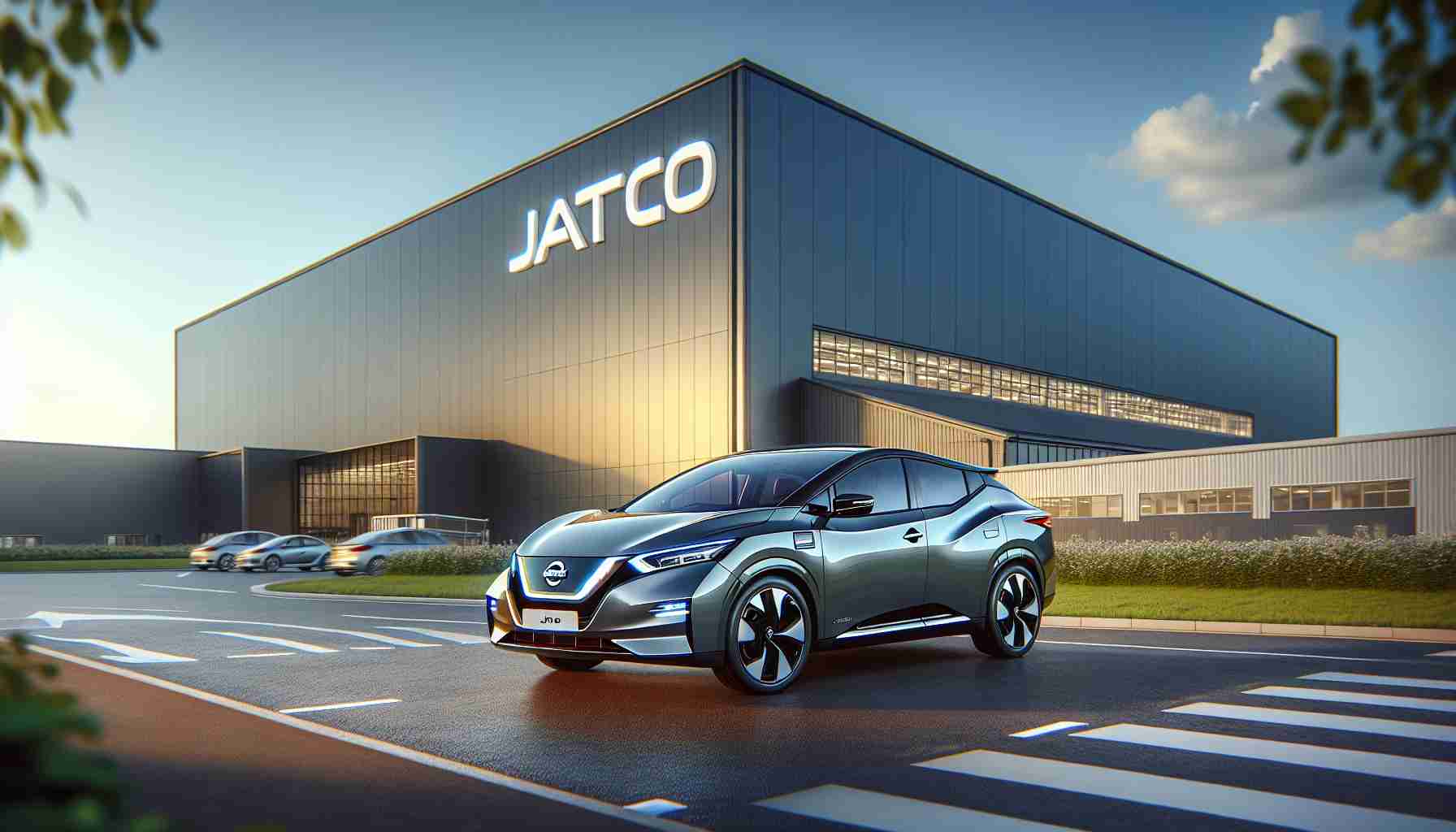Japanese automaker Nissan is enhancing its electric vehicle (EV) supply chain with a new partnership with JATCO Ltd, which will provide up to 340,000 annual EV powertrains from its upcoming factory in Sunderland, UK. Scheduled for completion in 2026, this facility is part of a strategic response to the growing competition from Chinese manufacturers and is backed by a British government grant aimed at supporting the country’s stringent EV mandates.
In an effort to adapt to the competitive landscape, Nissan has initiated discussions regarding a potential merger with Honda, coupled with plans to cut jobs and streamline global manufacturing operations. The company is also investing $1.4 billion into its Sunderland plant to produce electric versions of two car models, reflecting its commitment to transitioning towards an electrified future.
Alan Johnson, Nissan’s senior vice president for manufacturing, emphasized the importance of JATCO’s new facility, noting that its establishment in North East England will significantly enhance supply chain efficiency. The factory, which will span 138,840 square feet and involve a £48.7 million ($59.5 million) investment, is expected to generate around 183 jobs in Sunderland. JATCO operates additional production sites in Mexico, China, and Thailand, reinforcing its global footprint amid the evolving automotive landscape.
Broader Implications of Nissan’s EV Supply Chain Strategy
Nissan’s commitment to enhancing its electric vehicle supply chain is indicative of a larger transformation within the global automotive industry. As the race for EV dominance intensifies, the strategic moves by companies like Nissan not only impact the business landscape but also resonate through various societal and cultural dimensions. The establishment of JATCO’s new facility in Sunderland and its potential collaboration with Honda reflect a shift towards an electric future that influences consumer behavior and employment trends across communities worldwide.
The implications for society are particularly notable. As Nissan and JATCO ramp up production to meet rising EV demand, their actions will likely lead to increased consumer adoption of electric vehicles. This shift aligns with growing environmental consciousness among consumers who are increasingly prioritizing sustainability in their purchasing decisions. The production of 340,000 EV powertrains annually signifies a commitment to decarbonizing transportation, a critical step toward achieving global climate goals.
Economically, the partnership positions Nissan to better tackle the challenge posed by competitive forces, especially as it faces significant pressure from Chinese companies that have been rapidly expanding their market share. The multi-billion dollar investments being funneled into facilities like Sunderland are not merely about maintaining market presence; they are strategic plays aimed at fostering innovation and securing long-term viability in an increasingly saturated market.
Moreover, this move is likely to spark a ripple effect within the global economy. As Nissan bolsters its workforce and supply chains in the UK, it sets a precedent that may prompt similar actions among its peers. This could lead to a surge in job creation in associated sectors, fostering a more robust manufacturing base in regions that are pivotal to the EV supply chain.
In terms of environmental effects, the emphasis on electric powertrains signifies a shift towards reducing reliance on fossil fuels. By enhancing production capabilities for EVs, Nissan is contributing significantly to the reduction of greenhouse gas emissions within the transportation sector. However, this transition must be managed carefully to mitigate the ecological impact associated with increased lithium and cobalt mining for batteries. As the industry shifts, it brings to the forefront the urgent need to balance production demands with sustainable resource management.
Looking ahead, the long-term significance of Nissan’s strategic initiatives cannot be overstated. As countries worldwide implement stricter regulations on vehicle emissions, automakers must not only adapt but also innovate continually to thrive. The industry’s focus on electrification will likely lead to advancements in battery technology and renewable energy integration, shaping the future of transportation within the next decade.
In summary, Nissan’s strategic partnership with JATCO and the expansion of its EV supply chain in the UK illustrate a forward-thinking approach that could redefine the automotive industry. As these trends evolve, they offer profound implications for society, culture, and the global economy, heralding a transformative era in transportation that prioritizes sustainability and innovation.
Nissan’s EV Future: Insights and Implications for the Automotive Industry
As Nissan accelerates its shift towards electric vehicles (EVs) with a robust partnership with JATCO Ltd, several angles emerge that merit closer examination by industry observers. This strategic move, alongside its proposed merger discussions with Honda, illustrates a broader trend in the automotive sector responding to fierce global competition, particularly from Chinese manufacturers.
FAQ: What Does the Nissan and JATCO Partnership Entail?
Q: What is the significance of the new JATCO factory in Sunderland?
A: The newly established JATCO factory in Sunderland is crucial for Nissan’s EV supply chain as it will provide up to 340,000 annual EV powertrains. This local production aims to streamline the supply chain, reduce costs, and meet increasing demand for electric vehicles.
Q: How will this impact job creation in the UK?
A: The factory is projected to create about 183 jobs directly in Sunderland, contributing to local employment while supporting the broader UK economy, particularly in the automotive sector.
Pros and Cons of Nissan’s Strategic Moves
Pros:
– Local Production and Efficiency: By establishing production lines within the UK, Nissan can enhance supply chain logistics, reduce lead times, and potentially lower production costs.
– Job Creation: The partnership with JATCO and the investment in Sunderland not only contributes to job creation but also positions Nissan as a key player in Britain’s EV initiative.
Cons:
– Job Cuts Elsewhere: The push for efficiency may lead to job redundancies in other regions as Nissan streamlines operations. Conversations about potential job cuts might create unrest among workers.
– Dependence on JATCO: Relying heavily on a singular supplier can lead to vulnerabilities, particularly if JATCO faces its own production challenges or changes in business strategy.
Predictions: The Future of Nissan in the EV Market
As Nissan integrates JATCO’s powertrains into its offerings, experts predict the automaker will successfully elevate its market share in the EV sector in Europe and worldwide. If established production timelines are met and Nissan enhances its collaboration with JATCO, the company could redefine its brand image to appeal more to eco-conscious consumers.
Moreover, if merger discussions with Honda materialize, this could lead to a powerful alliance that enhances resource pooling, research and development capabilities, and expands product offerings. This potential dynamism may further fortify both companies against robust entrants in the EV market.
Quick Tips for EV Enthusiasts Looking into Nissan’s Future
1. Stay Updated: Follow Nissan’s announcements closely, as new partnerships and production updates will influence availability and pricing of their EV models.
2. Consider Regional Impact: Look for how local economies will fare with Nissan’s expanding operations. This can provide insight into job markets and community growth.
3. Understand the Competition: As Chinese automakers expand, it’s vital to compare technology, user experience, and pricing to gauge the best EV options based on personal preferences.
For those interested in further developments on electric vehicle technology, visit Electrive for the latest insights into the current EV landscape.


















